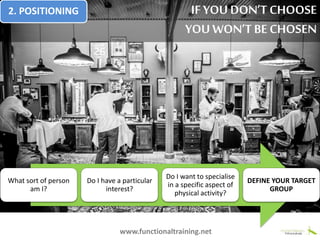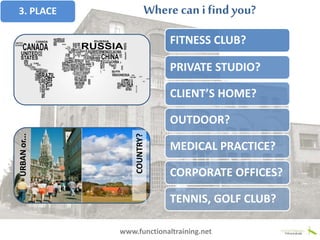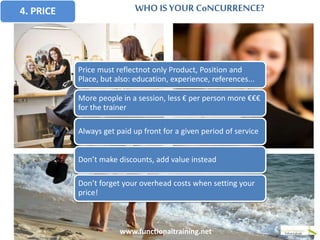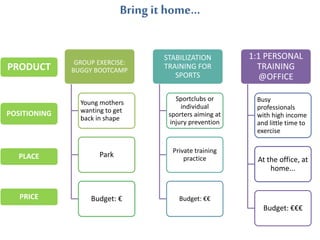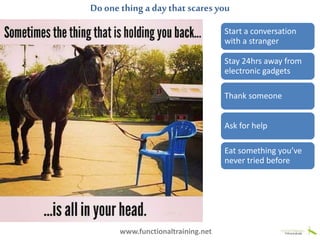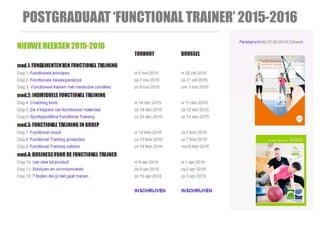How to become a successful personal trainer
- 1. www.functionaltraining.net ┬® Daniel Macri HOWTO BECOME A SUCCESsFUL PERSONAL TRAINER
- 2. 2003 ŌĆóMedical Faculty - University of Turin ŌĆóSport Medicine degree ŌĆō University of Glasgow ŌĆóFounder of Functional Training Academy ŌĆóCEO Functional Training Network MAX ICARDI 1999
- 4. www.functionaltraining.net 3. To increase the profitability of the business 2. To make enough money to live a comfortable lifestyle 1. To do something I enjoy or feel passionate about
- 7. www.functionaltraining.net ŌĆ£Choose a job you love, and you will never have to work a day in your lifeŌĆØ - Confucius-
- 9. The very things that keep you busy aren't necessarily the things of business. Is your business a busy-ness? www.functionaltraining.net If you want to go FAST, go alone. If you want to go FAR, go together.
- 10. SALEABILITY ŌĆó When you are replaceable, your company is more saleable. When someone buys your company, they will consider it more valuable if they can just take over the reins and it runs. FREEDOM ŌĆó This is probably one of the reasons you started the business in the first place. If you are the critical piece, you wonŌĆÖt be able to take time off. LEADERSHIP ŌĆó When you can systemize the day-to-day actions, you can shift into a role where you seek out new opportunities, try new things, and innovate PERSPECTIVE ŌĆó If you can manage to get yourself out of the day-to- day, it will give you a chance to watch the business from afar. MAKE YOURSELF REPLEACEBLE If you are going to build a company and canŌĆÖt be replaced, you are, in fact, building a trap. And thatŌĆÖs not something you want to get yourself into. www.functionaltraining.net
- 11. WHAT THEY DONŌĆÖT TEACH YOU IN SCHOOL www.functionaltraining.net
- 12. www.functionaltraining.net THE 5 PŌĆÖS OF BUSINESS 5. PROMOTION How are you going to inform your prospects about your offer? 4. PRICE What is the value of your services for those clients? 3. PLACE Where are you offering your services? 2. POSITIONING Who are the potential clients interested in your offer? 1. PRODUCT Which product/service are you offering?
- 13. How can i help you? www.functionaltraining.net 1. PRODUCT
- 14. RED OCEAN ŌĆó Compete in existing markets ŌĆó Try to beat the competition ŌĆó Price concurrence BLUE OCEAN ŌĆó Create new markets ŌĆó Competition is irrelevant ŌĆó Price = value www.functionaltraining.net 1. PRODUCT
- 17. HOW LONG WILLIT LAST ?! www.functionaltraining.net 1. PRODUCT
- 18. 1. PRODUCT SHOULDNŌĆÖT I DIFFERENTIATE? www.functionaltraining.net
- 19. 2002 - ... MAX ICARDI ŌĆó Personal Trainer ŌĆó Lecturer & Presenter ŌĆó PT studio owner 2008 - ... FUNCTIONAL TRAINING NETWORK ŌĆó Quality label for personal trainers ŌĆó Registered brand 2011 - ... FUNCTIONAL TRAINING ACADEMY ŌĆó Postgraduate educaion ŌĆó Workshops for professionals 2013 - ... OUTSIDE THE BOX ŌĆó Outdoor Training studio ŌĆó Bed & Breakfast ŌĆó Seminar room 1. PRODUCT GROWYOUR OFFER www.functionaltraining.net
- 20. Baby Bootcamp bring yourbaby, get fit! WOMEN ŌĆóWAY too broad ŌĆō almost impossible to define common needs YOUNG MOTHERS ŌĆóBetter. More specific and narrows down a certain segment of the population YOUNG MOTHERS WHO WANT TO BE BACK IN SHAPE ŌĆóWonderful! YouŌĆÖve addressed a unique audience with a defined need 2. POSITIONING WHO IS IT FOR? www.functionaltraining.net
- 21. When it comes to growing a business few things have more power than a narrow focus. Too often business owners want to be many things in order to capture as much business as possible. [...] itŌĆÖs like a hawk taking a bird: even when it enters into the midst of thousands of them, it gives no attention to any bird other than the one that it has first marked ŌĆō www.functionaltraining.net FOCUS, FOCUS, FOCUS...2. POSITIONING
- 22. What sort of person am I? Do I have a particular interest? Do I want to specialise in a specific aspect of physical activity? DEFINE YOUR TARGET GROUP www.functionaltraining.net IF YOU DONŌĆÖT CHOOSE YOU WONŌĆÖT BECHOSEN 2. POSITIONING
- 23. 3. PLACE URBANor... COUNTRY? FITNESS CLUB? PRIVATE STUDIO? CLIENTŌĆÖS HOME? OUTDOOR? MEDICAL PRACTICE? CORPORATE OFFICES? TENNIS, GOLF CLUB? www.functionaltraining.net Where can i find you?
- 24. 4. PRICE WHO IS YOUR CoNCURRENCE? www.functionaltraining.net Price must reflectnot only Product, Position and Place, but also: education, experience, references... More people in a session, less Ōé¼ per person more Ōé¼Ōé¼Ōé¼ for the trainer Always get paid up front for a given period of service DonŌĆÖt make discounts, add value instead DonŌĆÖt forget your overhead costs when setting your price!
- 25. GROUP EXERCISE: BUGGY BOOTCAMP Young mothers wanting to get back in shape Park Budget: Ōé¼ STABILIZATION TRAINING FOR SPORTS Sportclubs or individual sporters aiming at injury prevention Private training practice Budget: Ōé¼Ōé¼ 1:1 PERSONAL TRAINING @OFFICE Busy professionals with high income and little time to exercise At the office, at home... Budget: Ōé¼Ōé¼Ōé¼ Bring it home... PRODUCT POSITIONING PLACE PRICE
- 26. www.functionaltraining.net Start a conversation with a stranger Stay 24hrs away from electronic gadgets Thank someone Ask for help Eat something youŌĆÖve never tried before Doone thing a day that scares you
- 28. POSTGRADUAAT ŌĆśFUNCTIONAL TRAINERŌĆÖ 2015-2016
Editor's Notes
- Three questions, three words as answers: Name One quality about yourself What do you expect about today?
- Blue Ocean Strategy┬Āis a book published in 2005 and written by┬ĀW. Chan Kim. Based on a study of 150 strategic moves spanning more than a hundred years and thirty industries, Kim & Mauborgne argue that companies can succeed not by battling competitors, but rather by creating ŌĆ│blue oceansŌĆ│ of uncontested market space. Red oceans┬Ārepresent all the industries in existence today ŌĆō the known market space. In the red oceans, industry boundaries are defined and accepted, and the competitive rules of the game are known. Here companies try to outperform their rivals to grab a greater share of product or service demand. As the market space gets crowded, prospects for profits and growth are reduced. Products becomecommodities┬Āor┬Āniche, and cutthroat competition turns the ocean bloody; hence, the term┬Āred oceans.[4] Blue oceans, in contrast, denote all the industries not in existence today ŌĆō the unknown market space, untainted by competition. In blue oceans, demand is created rather than fought over. There is ample opportunity for growth that is both profitable and rapid. In blue oceans, competition is irrelevant because the rules of the game are waiting to be set. Blue ocean is an analogy to describe the wider, deeper potential of market space that is not yet explored.[4][5] Cirque du Soleil┬ĀŌĆō an example of creating a new market space, by blending opera and ballet with the circus format while eliminating star performers and animals

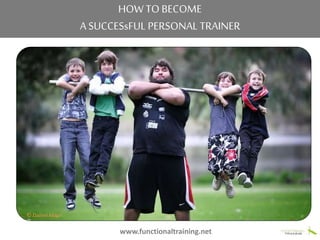
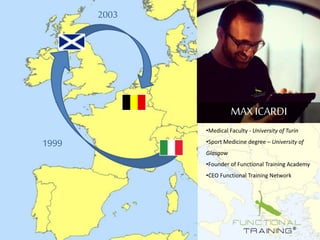

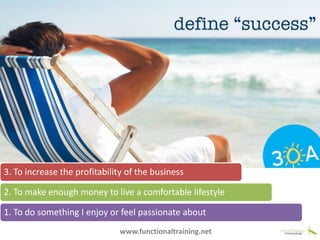



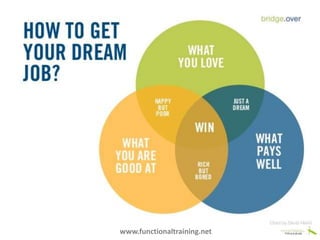
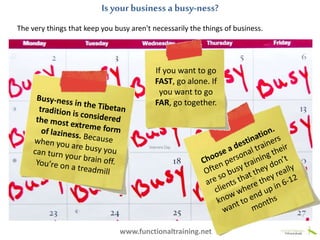
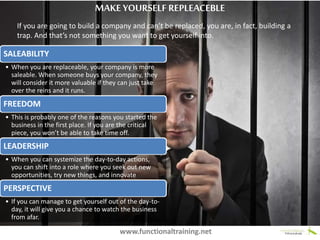

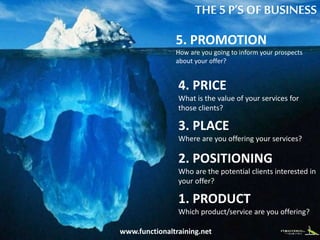

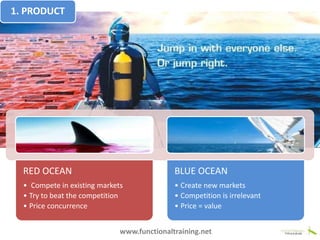
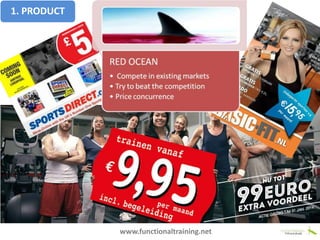
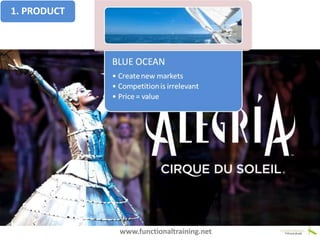
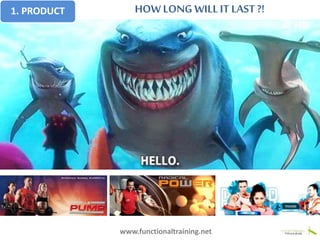
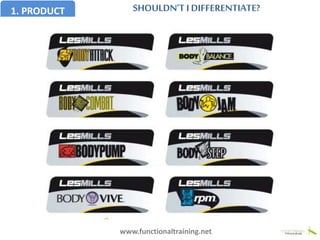
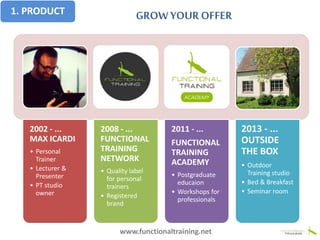

![When it comes to growing a business few things have more power than a narrow
focus. Too often business owners want to be many things in order to capture as
much business as possible.
[...] itŌĆÖs like a hawk
taking a bird: even when
it enters into the midst of
thousands of them, it
gives no attention to any
bird other than the one
that it has first marked ŌĆō
www.functionaltraining.net
FOCUS, FOCUS, FOCUS...2. POSITIONING](https://image.slidesharecdn.com/gettogetherconvention-150501093128-conversion-gate01/85/How-to-become-a-successful-personal-trainer-21-320.jpg)
